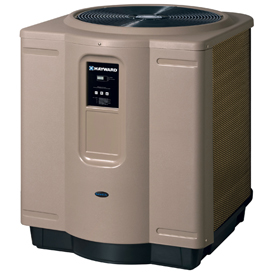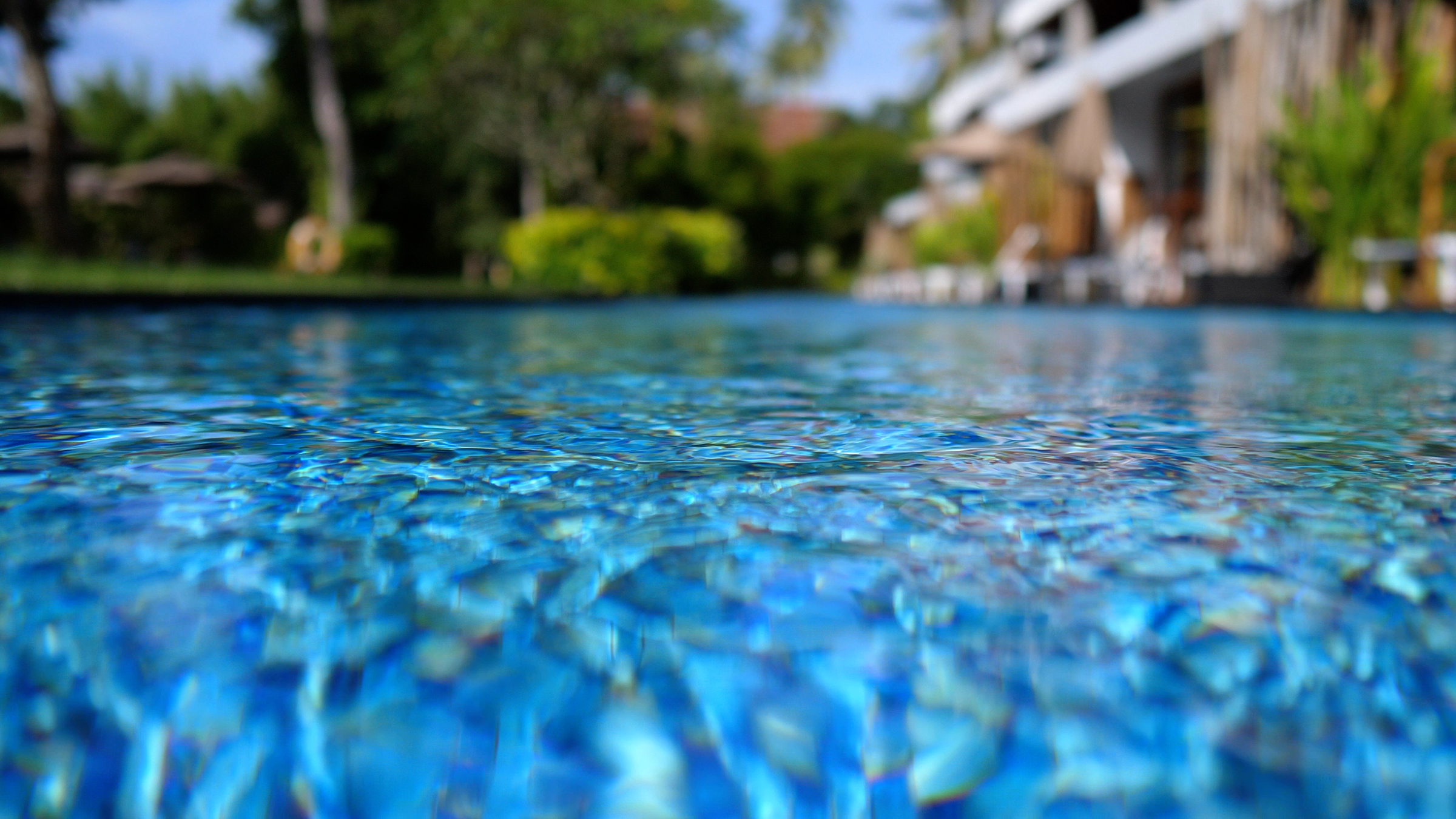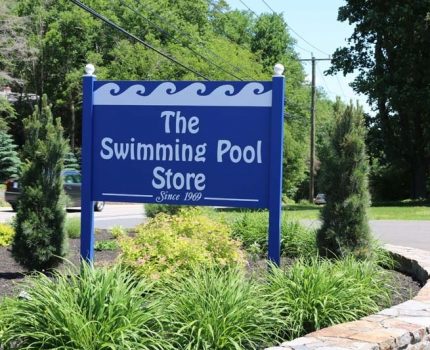A pool heat pump is a pool heater that runs from electricity but differs from what some might call a traditional electric pool heater in that it uses energy to harvest heat from the air to transfer that heat to your pool water, rather than generating heat from an electric heating element. This is extremely energy efficient and could be the most cost-effective method of heating your pool to extend your swimming season by a full month or even two.
 How a Heat Pump Pool Heater Works
How a Heat Pump Pool Heater Works
A pool heat pump works by using heat that is already available and moving it from one place to another, using less electricity. The heat pump pool heater uses a fan to draw air in from the outside to direct it over an evaporator coil. A liquid refrigerant contained in the coil absorbs the heat from the air outside and converts it to a gas. This warm gas is passed through a compressor that increases the heat and makes a very hot gas that passes through a condenser and is then transferred into the cooler water that circulates through the heater and is returned to your pool.
The really nice thing about this type of pool heater is that even though it uses air from the outside to produce nice warm pool water, the outside temperature only has to be above 45°F to 50°F for it to work very effectively and efficiently. You can use it before the hot summer weather arrives and can continue to swim past Labor Day in climates like Connecticut, where we often have to close the pool once summer is over around the end of August.
An electric heat pump can give you a full two extra months of swim time, and when we only have a few swimming months to begin with, this is well worth the investment.
Choosing a Pool Heat Pump
A pool heat pump will cost more than a gas pool heater, although will typically last longer than gas pool heaters and will cost much less in operating expenses due to higher energy efficiency. The most important factors in choosing a heat pump for your pool are:
- Size of heater for your pool
- Efficiency
- Costs of operation
Choosing the Right Heat Pump Size
Sizing your heat pump pool heater should be done by a trained pool professional who knows how to perform a proper analysis for your specific swimming pool. Selecting the right size of a pool heat pump is based on the surface area of your swimming pool and the difference in average air temperatures of your pool water and the average outside air.
Other factors that affect the heating load needed for outdoor pools include humidity levels, temperatures on cool nights, and exposure to wind. Swimming pools that are located outdoors with exposure to higher than average wind speeds, cool nights, and low humidity will need a larger heat pump to effectively and efficiently heat the pool water.
Pool heat pumps are rated by horsepower (hp) and Btu output, with standard sizes in the range of 3.5 hp/75,000 Btu, 5 hp/100,000 Btu, and 6 hp/125,000 Btu. According to the Department of Energy, you can calculate the size of the heat pump needed for your pool by following these steps:
- Decide on the pool water temperature desired
- Determine what the average temperature is during the coldest month of use
- Subtract the average coldest temperature from your desired temperature to determine the required temperature rise
- Calculate the square footage of your pool surface area
- The following formula will determine the size of the pool heat pump to reach your desired temperature for your size of pool:
Pool Area x Temperature Rise x 12
This calculation is based on raising the temperature by 1° to 1 ¼°F per hour with an average wind speed of 3 ½ mph. If an increase of 2°F is desired, simply multiply by 2.0.
Pool Heater Consultation
How to Determine Pool Heat Pump Efficiency
The coefficient of performance (COP) measures the energy efficiency of any device that transfers heat, including pool heat pumps. The greater the COP factor, the more efficient your heat pump pool heater will be and the less it will cost to operate over a lower COP number. All heaters are compared to resistance heating, the standard of passing water over red-hot coils, which has a constant COP of 1. Most heat pump pool heaters have a COP of about 5 to 6, which means an efficiency rating of 500% to 600%.
Pool Heat Pump Costs and Savings
The Department of Energy has a table to show pool owners the cost and savings of a pool heat pump over a gas pool heater by location. For example, the cost to maintain a pool temperature of 80° in New York from May 1st to Sep 30th is averaged to be about $1,300 for the season. Using a pool heat pump with a COP of 5, the savings over a gas heater could be up to $800 per year.
Heat Pump Pool Heater Installation and Maintenance
The Swimming Pool Store in Connecticut provides pool heater installations and offers a professional pool heater consultation to ensure that you install the right type of heater for your pool. We examine all of the important factors and help to calculate your total costs and savings over other pool heating technologies. The right type of pool heater for your swimming pool depends on the factors listed above, as well as the amount of sun exposure, whether or not you use a solar cover, and how quickly you wish to heat your pool.
To learn more about the different types of pool heaters, the technology, cost-efficiency, and pros and cons of each type, check out our FREE Guide:
Navigating Heating Pool Technologies: A Comprehensive Guide
The Swimming Pool Store has been providing friendly, professional pool services for more than 50 years. We offer a large pool store with everything you need to keep your pool clean, chemically balanced, and of course, lots of fun and relaxation. Contact us with any questions and schedule your pool heater consultation today to earn more about energy-efficient pool heat pumps.


